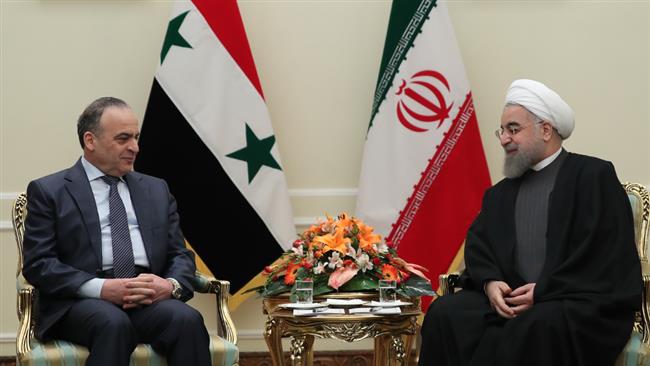
Iran’s government has signed major economic contracts with Assad regime in return for its efforts in stabilizing Assad’s role, a move that many saw as selling Syria to the Iranians and ensuring its role in Syria’s future despite Russia’s aim in sidelining them.
Iran is seeking to widen its influence in the area and Syria was the perfect next step. Iran supported Assad regime by money and fighters to defend his role, in return to freeing Iran’s hand in Syria to achieve its long-awaited dream.
Iran-backed militias supported Assad regime, protected it from being overthrown by the rebel forces, and helped it to achieve important victories against the rebels.
Iran started a demographic change in the Sunni-populated areas in Syria and sought to change the face of the Syrian cities by forcing the Shiite festivals in the heart of Damascus, adding Syria to the list of its controlled areas and making it gradually the 32nd Iranian province.
Iran also has framed its war effort in sectarian terms, insisting the men it has sent to fight are in Syria to defend the shrine from “Sunni extremists”.
However, Iran’s plans became uncertain after Assad’s other ally, Russia, interfered to support Assad and find a solution for the Syrian crisis.
Russia needs Syria as a strong country that serves as an ally in the future. Russia wanted to use the peace talks to end in a political solution that ends the Syrian crisis and stops the war and military operations, as the more this war lasts the more Syria will be destroyed and harder to be rebuilt again.
On the contrary, Iran refuses any reconciliation between the government and the rebels. Iran wants the war to last until all the opposition forces are annihilated not caring for the destruction and lost lives. Iran needs Syria as a weak and destroyed land which will be easier to control and easier to be shaped in the future in the way that serves Iran’s goals.
Therefore, Russia started to depend more on Turkey in bringing the regime and opposition together. Both Russia and Turkey have guaranteed the implementation of the ceasefire deal and decided together to invite the US administration to the upcoming peace talks, a move the Iran has strongly refused.
New economy ties with Iran, new goals
However, Iran didn’t miss the chance and cemented its roots in Syria by signing major economic contracts with the Assad regime. With this move, Iran guaranteed its forces place in Syria in addition to the economic benefits it will gain.
Five memorandums of understanding were signed during a visit by Syrian Prime Minister Emad Khamis to Tehran on Tuesday, including a license for Iran to become a mobile phone service operator in Syria, and phosphate mining contracts.
In a meeting on Wednesday with Ali Akbar Velayati, the top adviser to Iran’s Supreme Leader, Syrian premier Khamis called for investment in reconstruction projects in Syria, as “the infrastructure has been destroyed by war”.
Syrian state news agency SANA quoted Khamis as saying the deals reflect the special relationship between the two nations.
“We greatly appreciate Iran’s major role in combating terrorism and standing by the Syrian people in every way, politically and economically,” he said.
Syria will give Iran 5,000 hectares of land for farming, and 1,000 hectares for setting up oil and gas terminals, according to Iran’s state news agency IRNA. A deal was also signed on providing lands for animal husbandry.
Analysts said the Islamic Revolutionary Guards Corps (IRGC), a military force that runs a powerful industrial empire in Iran, would benefit from the deals, especially on the mobile network contract. IRGC largely controls telecommunications in Iran.
Apart from military assistance, Syria is increasingly indebted to Iran financially: Tehran opened a $3.5 billion credit line in 2013, and extended it by $1 billion in 2015, which economists say has helped keep the Syrian economy afloat.
SANA quoted Iran’s vice president Eshaq Jahangiri as saying Tehran was ready to “implement a new credit line between Syrian Trade Bank and Export Development Bank of Iran” to help trade.
Tehran and Damascus also signed a memorandum of understanding to cooperate in a phosphate mine in Syria’s al-Sharqiya, according to IRNA.
The Iranian energy minister was also quoted as saying by SANA that Tehran was ready to sign a long-term agreement with Damascus in energy sector.
Iranian firms are already involved in a series of electricity generation projects worth $660 million in Syria, according to state media in the Islamic Republic.
Iran aims to export electricity to Syria and create the biggest power network in the Islamic world by hooking up Iran’s national grid with those of Iraq and Lebanon.
Syrian opposition groups condemned the telecommunications and mining deals signed with Iran, Damascus’s main regional ally, as “looting” of the Syrian people and the country’s wealth by the “Iranian extremist militias”.
“These agreements represent further a blatant violation of Syria’s sovereignty as they are meant to reward an occupation force in return for its involvement in shedding the Syrian people’s blood and attempting to break their will,” the Syrian National Coalition said in a statement on its website.
The Syrian crisis began as a peaceful demonstration against the injustice in Syria. Assad regime used to fire power and violence against the civilians and led to armed resistance. 450.000 Syrians lost their lives in the past five years according to UN estimates, and more than 12 million have lost their homes.
